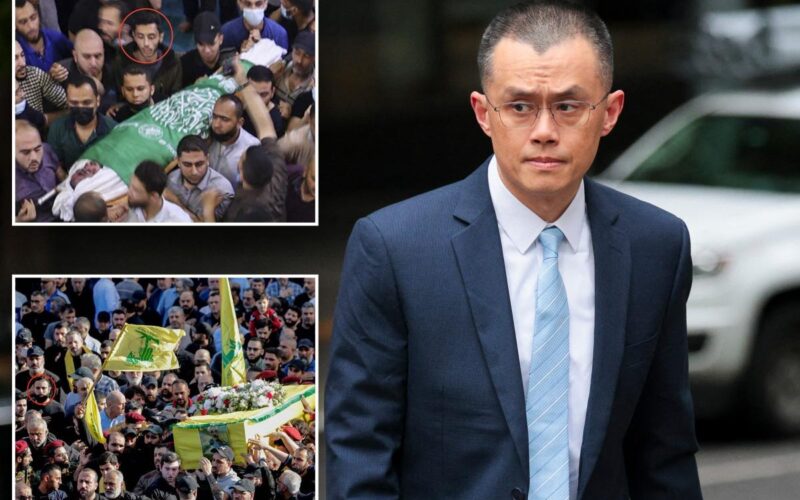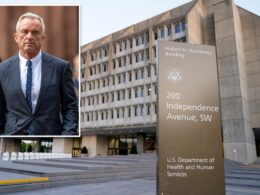WASHINGTON — Families of victims of Hamas’ Oct. 7, 2023, attack on Israel sued Binance Monday, claiming that the world’s largest cryptocurrency trading platform — and its recently pardoned founder and former CEO Changpeng Zhao — helped smooth the transfer of more than $1 billion to the accounts of terror groups responsible for the atrocity.
The lawsuit was filed on behalf of 76 US national plaintiffs and their family members who were murdered, maimed, or taken hostage on Oct. 7 in Israel or in various terrorist acts afterwards. They brought their claims against Binance, Zhao and senior executive Gunagying “Heina” Chen in Fargo, ND federal court.
The crypto platform had already been subject to criminal enforcement actions by the Department of Justice in 2023, resulting in Binance admitting to charges of money laundering and paying more than $4 billion in fines — as well as a four-month prison sentence for Zhao.
But the nearly 300-page complaint stated that Binance’s conduct was “far more serious and pervasive than what the US government disclosed” during those proceedings — and that the company “knowingly sent and received the equivalent of more than $1 billion to and from accounts and wallets controlled by the [foreign terror organizations] responsible for the October 7 Attacks.”
Those include Hamas, Hezbollah, Palestinian Islamic Jihad and Iran’s Islamic Revolutionary Guard Corps, according to the suit brought by attorneys at Willkie Farr & Gallagher LLP, Osen LLC, Stein Mitchell Beato & Missner LLP, and Motley Rice LLC.
“To this day, there is no indication that Binance has meaningfully altered its core business model,” the attorneys said in the suit, alleging the crypto platform was “intentionally designed as a criminal enterprise to facilitate money laundering on a global scale.”
Ali Mohammad Alawieh, the son of Hezbollah commander Muhammad Abd al-Rasul Alawieh, is the holder of one of the Binance accounts identified in the lawsuit.
He can be seen in photos at the funeral procession for Hezbollah commander Ahmed Shehimi, who was killed by a strike in Syria in March 2024.
Other accounts were tied to Hamas-linked exchange houses or located inside Gaza — including a 25-year-old PIJ operative in Khan Yunis who had opened a Binance account in October 2020.
Photos published by Reuters and Agence France-Presse show the PIJ militant at the May 2021 funeral of a Hamas operative killed by the Israeli military.
The alleged money laundering scheme laid out in the complaint reveals that some Hezbollah funds were also linked to “illicit gold smuggling” operations “via cryptocurrency transfers made to Venezuelan and Brazilian” criminal networks.
One 26-year-old Venezuelan woman who seemingly works for a livestock and agriculture-related firm in Roraima, Brazil, was allegedly serving as a front for that network, moving at least $40 million through a single account identified by the plaintiffs’ lawyers.
“Our investigation shows that Binance built systems designed to evade oversight, using its off-chain network and weak controls to move enormous sums for sanctioned groups,” said Jonathan Missner, managing partner of Stein Mitchell Beato & Missner LLP. “This platform became a conduit for financing murder, kidnappings, and rocket attacks. The families deserve justice—and the public deserves transparency.”
Zhao remains a majority owner of Binance, which the Oct. 7 victims’ families maintain “knowingly, willfully, and systematically assisted Hamas, the IRGC, Hezbollah, PIJ, and other terrorist groups to transfer and conceal the equivalent of hundreds of millions of U.S. dollars through the Binance platform in support of their terrorist activities.”
The venue for the suit stems from allegations that “Binance customers affiliated with Hamas to execute transactions from IP addresses in the United States, including at least nine operations and at least two transactions executed via IP addresses in Kindred, North Dakota.”
“We believe these allegations make clear that Binance bears liability for the October 7 attacks,” added former Bill Clinton and George W. Bush White House official Lee Wolosky, now of Willkie Farr & Gallagher LLP, in a statement.
“The lawsuit details how Binance knowingly facilitated hundreds of millions of dollars that helped enable those responsible for the atrocities of October 7. When a company chooses profit over even the most basic counter-terrorism obligations, it must be held accountable — and it will be.”
The families are seeking both compensatory damages “in amounts to be determined at trial” and treble damages for victims of terror.
President Trump pardoned Zhao, known as “CZ,” in October after months of lobbying for the billionaire crypto mogul’s conviction to be wiped away, easing his firm’s return to US markets.
White House press secretary Karoline Leavitt said CZ “was prosecuted by the Biden Administration in their war on cryptocurrency,” which was now “over.”
“You never know if it’s going to happen, or when it’s going to happen, so I was a little bit surprised,” Zhao later told Fox News.
“I don’t know him. I don’t believe I’ve ever met him,” Trump told reporters when news of the pardon leaked. “He had a lot of support, and they said that what he did is not even a crime, it wasn’t a crime that he was persecuted by the Biden administration and so I gave him a pardon at the request of a lot of very good people.”
Monday’s civil suit cites past reports and federal investigations that showed how little the crypto mogul’s firm cared about cracking down on money laundering.
Binance’s former chief compliance officer Samuel Lim, when presented with evidence of transactions on the platform financing criminal activity, reportedly said in February 2020: “Like come on. They are here for crime.”
“Binance’s comically titled Money Laundering Reporting Officer agreed,” the suit noted, “commenting ‘we see the bad, but we close 2 eyes.’”
“We cannot comment on any ongoing litigation,” a Binance spokesperson told The Post in a statement.
“However, as a global crypto exchange, we comply fully with internationally recognized sanctions laws, consistent with other financial institutions. For context, the heads of the US Treasury’s [Financial Crimes Enforcement Network] and [Office of Foreign Assets Control] have confirmed that cryptocurrency is not widely used by Hamas terrorists. Most importantly, we hope for lasting peace in the region.”








